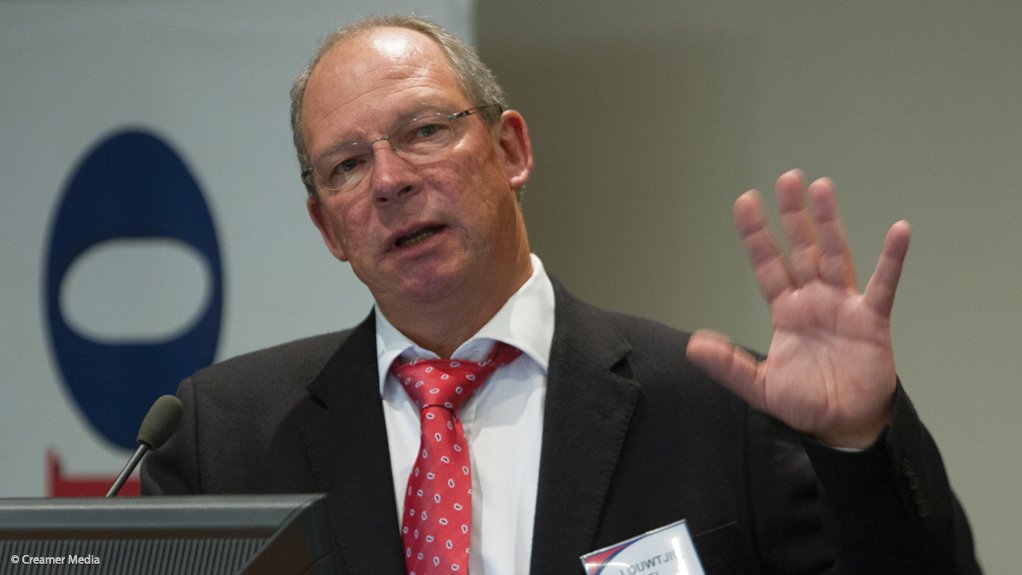One of the main drivers behind Wilson Bayly Holmes-Ovcon’s (WBHO’s) healthy jump in profit in the 2016 financial year was the company’s success in grabbing a bigger share of the market, rather than an improving domestic environment, said CEO Louwtjie Nel on Tuesday.
A strong push in the building sector saw WBHO report a 72% improvement in operating profit, to R991-million, for the year ended June 30.
Revenue increased by 6.3%, to R30.6-billion, compared with the 2015 financial year.
“I don’t think the market in South Africa is improving,” stated Nel.
That said, however, a “number of big projects on the infrastructure side” had appeared on the horizon, rather suddenly, for the first time in “four or five years”.
Certain mining houses, especially in the platinum and coal markets, were also making enquiries regarding projects which had been shelved, he said.
“The market is still tough, there are no fireworks, but the sun may one day rise again.”
Nel said WBHO was “very happy” with the 2016 numbers, noting that the growth seen within the group’s building divisions in Africa and Australia moderated the impact of lower activity levels within the mining and civil engineering sectors.
Revenue at Africa-based operations decreased by 7%, following declines in revenue from the roads and earthworks and civil engineering divisions.
Revenue growth in Australia reflected real growth of 8% in Australian dollar terms, but was assisted by a weaker rand, where a currency effect of R1.5-billion resulted in overall growth of 18%.
The overall WBHO margin increased to 3.3%, compared with 2.7% in the previous financial year.
The group’s cash balance increased by a further R1.8-billion to R5.8-billion.
Nel said WBHO was “looking for international opportunities” – of which there were quite a few – in the construction sector to spend this cash.
Civils in a Tough Space
WBHO’s Building and Civil Engineering division saw operating profit increase from R352-million, to R370-million for the year ended June 30.
Within the building market, the high levels of local building activity experienced in previous years were sustained, with building
revenue from South Africa growing by 26%.
Most of the growth was concentrated in Gauteng.
Within civil engineering, the persistent commodity slump continued to curb the number of available projects from the mining sector.
Due to its heavy reliance on this sector, the civil engineering division had, in recent years, been particularly affected by the downturn, with revenue decreasing by 40% to June 30.
Having completed all existing mining projects during the current year, finding replacement work has been challenging and the division is again being right-sized.
The division’s revenue from the rest of Africa once again decreased during the 12-month period, following completion of construction of a new gas-fired power station, in Mozambique.
The Roads and Earthworks division saw operating profit decline from R380-million to R283-million.
Mining-related activity in South Africa decreased substantially, following the completion of existing projects. However, the division replaced this work with mining projects in Mozambique, Botswana and West Africa.
The high volume of roadwork on hand persisted through the 2016 financial year.
Operating profit within the Australia division recovered from R11-million to R300-million.
The building division performed well.
However, revenue from WBHO Infrastructure, the group’s civil engineering business in Australia, decreased as a result of the planned restructuring of the business.
Operating profit at the Construction Materials division increased from R13-million to R37-million.
Following the disposal of 3Q Mahuma Concrete Holdings during the year, Reinforced Mesh Solutions remains as the only continuing operation.
WBHO’s order book increased by 14%, from R37.4-billion in the 2015 financial year, to R42.7-billion in the 2016 financial year.
The order book showed a sharp increase within the Australian building divisions, while the Building and Civil Engineering and Roads and Earthworks order books declined locally, as well as in the rest of Africa.
The Australian order book comprised 72% of the total book while the African book dropped to 28%, compared with 34% at June 30, 2015.
Looking ahead, Nel said the local building market would continue to deliver sufficient major projects for at least the next 12 months.
The Australian building markets also show continued strength.
WBHO has shed around 3 000 jobs over the last 18 months, which include contract and permanent staff.
However, should “two or three projects materialise”, the company would need to again employ staff, noted Nel.
Edited by: Creamer Media Reporter
EMAIL THIS ARTICLE SAVE THIS ARTICLE
To subscribe email subscriptions@creamermedia.co.za or click here
To advertise email advertising@creamermedia.co.za or click here













